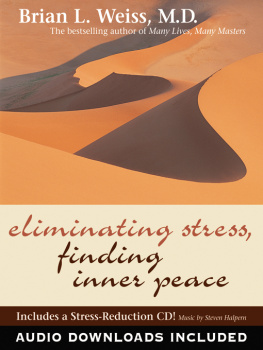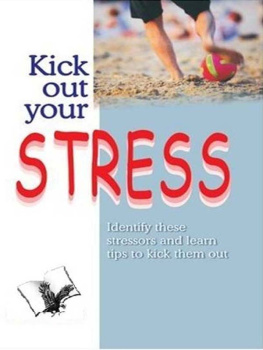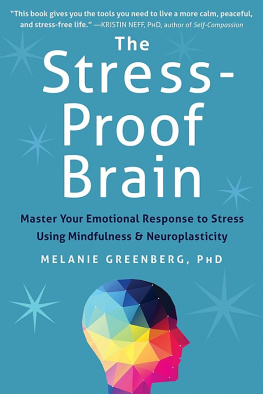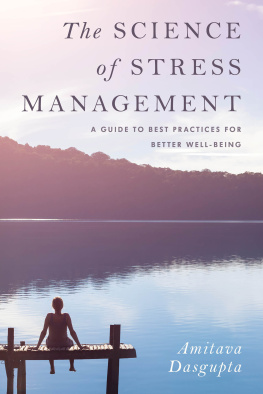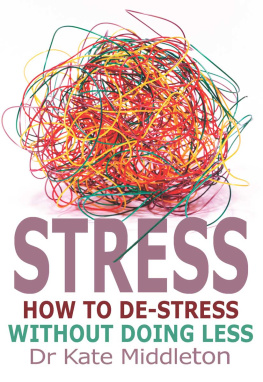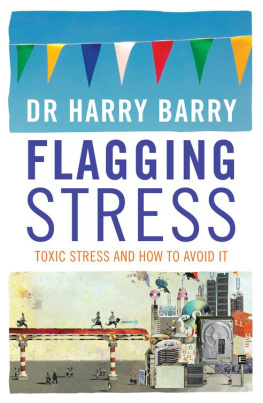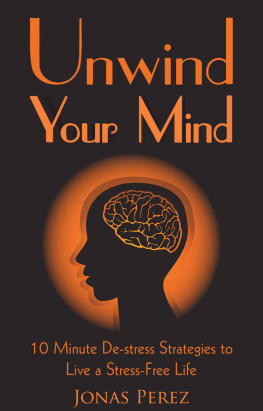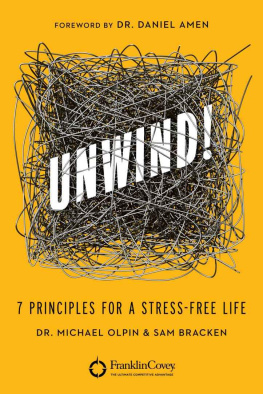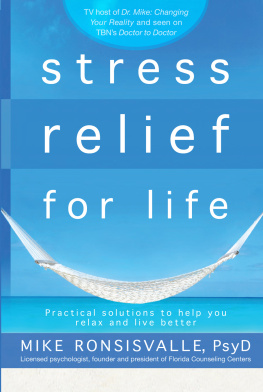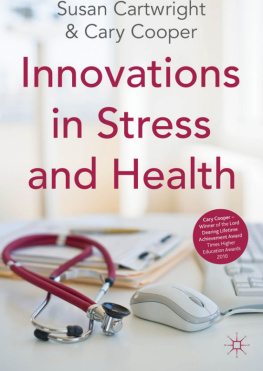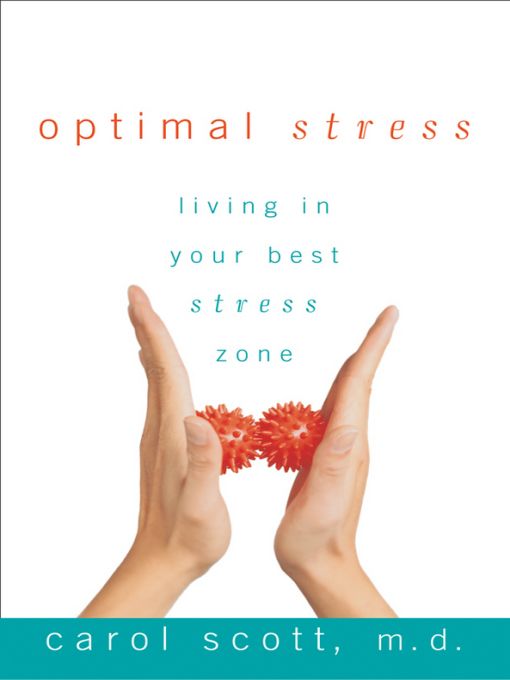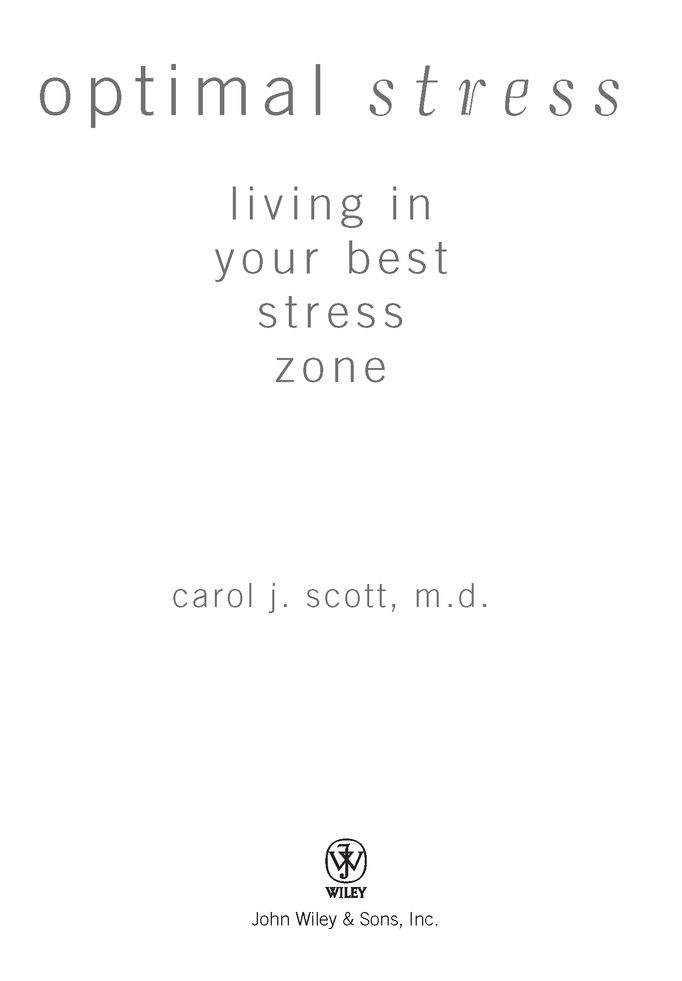Table of Contents
To my husband, Alex.
Thank you for your unlimited unconditional love.
preface
Stress is inevitable and generally unavoidable. Our response to stressthe automatic unconscious changes in our bodies and minds when we confront a crisisoften is the key to our survival. Most people dont think about it this way, but a life without stress is very likely not much of a life at all. We are most alive when we are challenged, and we respond by becoming sharper, stronger, and faster in both body and mind. Thats the right and healthy way that people cope with the world around them.
The human body, however, as marvelous and miraculous as it is, hasnt had a chance to evolve with the lightning speed of the world around it. A few thousand years ago we were fighting off predators with sticks and stones. A few hundred years ago we got our food directly from the earth or the sea. A few generations ago we still communicated by pen and paper. The body hasnt changed much in that time, yet today we cope with everything from cell phones, text messages, and virtual meetings to traffic jams, viruses transported across oceans by airlines, instant round-the-world communication, and what feels like a complete loss of privacy, control, and the illusive balance we seek on a day-to-day basis.
You might think that youre still better off. None of that craziness represents any real danger or physical threat. In fact, nothing could be further from the truth. Research has proved that the tiny little stress triggers represented by each buzzing cell phone or obnoxious driver in front of you produce exactly the same physiological reactions in your body that a face-to-face encounter with a grizzly bear would. The chemical and neurological changes might be smaller on an individual basis, but the buildup caused by prolonged and relentless triggers can be fatal. I see it every day in the emergency room.
The truth is, having a balanced life is about having a balanced body-mind chemistry. Realizing this is at the core of understanding how to think about optimal stress. Stress is a condition that results from the interaction of the mind and the body. It is the mind that interprets situations and communicates with the whole bodythe heart, the immune system, the gastrointestinal tract, the skin, and other bodily systems. In this book, Ill give you a doctors-eye view of exactly how stress affects the body.
There is no denying that the stress response is absolutely necessary for peak experiences and performances, for joy and creativity, and for maximum productivity. It can literally protect us in critical situations. But when your stress response is activated too often or for too long, it can become counterproductive and even fatal. The goal of my program is to ensure that your good stress never tips over into bad or dangerous stress, or at least not too often. When you examine your life using the assessment tools Ive provided here, I want you to be able to focus and channel your activities so that you can optimize your stress response and truly harness it for greater productivity and satisfaction. This is what I call living with optimal stress in the BestStress Zone. It may not be easy, but nothing could be more important. This is the work of discovering what really makes you tick.
Lets begin the journey together.
acknowledgments
This book has been a labor of love. As an emergency physician, Ive learned to expect the unexpected. Still, I never expected quite so many unexpected hurdles in the writing process. The greatest was the passing of my mother two years ago. She was thrilled when my book contract arrived, and I so wish that she could have seen the project come to completion. My mother and father (who both passed away several years ago) were hardworking teachers on Chicagos South Side. I was fortunate to grow up in a household where hard work, integrity, simple pleasures, and achievement were treasured. They ideals continue to inspire me on a daily basis. Writing this book was a clarifying and therapeutic process for me. It would be quite an understatement to say that the writing process required me to take more than the occasional dose of my own medicine. Physician, heal thyself, they say, but there are many people who helped me get this task done.
To be sure, this book would not have been possible without my book agent, Jill Kneerim of Kneerim & Williams. Jill believed in me and the value of this project from the day we first met almost five years ago. Thank you for your generosity, kindness, perseverance, and patience.
There would be no book without my writing partner, David Sobel. David was with me every step of the way, from the concept to the actual writing and editing. He helped give shape and clarity to a great overabundance of material and never gave up hope. I thank him for his skill and his insight, his patience, and his persistence.
I am indebted to the well-orchestrated team at John Wiley & Sons. Tom Miller, executive editor, was unusually accessible and understanding and made the publishing process effortless. Christel Winkler, editor, and Kimberly Monroe-Hill, senior production editor, combined their talent and expertise to finalize the manuscript with meticulous attention to detail.
Gratitude also to supportive colleagues and friends: Elizabeth Weed, Shirley Hanley and the late Edgar Hanley, Vanessa Stovall, Dr. Gloria Williams and Victor Williams, Dr. Cynthia Morgan, Dr. John Payne and Judy Payne, Linda Kesselring, Karen Harrop, Tony Williams, Alice Cherbonnier and Marc Cherbonnier, Dr. Thomas LaViest and Bridgette LaViest, Coach Frank Keefe, Laura and Glenn Miller, Mrs. Ethel Reed, Dr. Roger Blumenthal, Jacinta Gauda, Barbara Johnson, Dr. Patrice Boddie, Lily May Johnson, Dr. Charles Terrell, Dr. Carin Basgal, Dr. Marshall Goldsmith, Carol Evans of Working Mother Media, Juanelle Teague of People Plus, James Huggins, Peggy Henderson at IBM, Al Martella, Rosanna Innis and Catherine Kapferer at Merrill Lynch, Terry McClure and Adrienne Holland at UPS, Verna Felton and Robyn Hendrickson at Microsoft, Wendy Brieterman at Johnson & Johnson, and my sisters, Patrice and Karen, who have given me special motivation during this venture.
My work in emergency medicine has privileged me to work with and get to know many patients and families, including those in the military. This book focuses on the stress of nonmilitary individuals in their day-to-day lives. I am obliged to give special thanks to active duty and retired military soldiers and their families. I know that it is their mission and focus that enable them to harness and channel the stress in their lives so that it becomes a means to gratification. I salute them, and I thank them.
Finally, the men in my life, my husband, Alex, and my sons, Alec and Douglas, have been, like any family members, occasional sources of stress, as I have been to them, but on a deeper level, they have represented the cure. As youll discover later in my book, the secret of optimal stress is aligning the activities of your life with your purpose, your passions, and your prioritiesexactly what these three magnificent men represent to me.
introduction
Always expect the unexpected. Im an emergency room (ER) doctor, so youd think I would have known that. Im sure my boys knew it as they sat waiting for me to pick them up from school one afternoon a few years back. Im sure they expected me to be late, and I didnt disappoint them.


